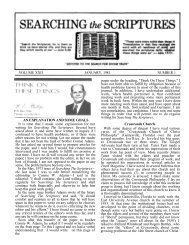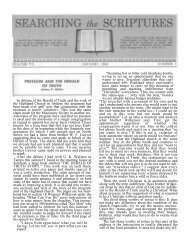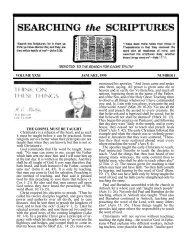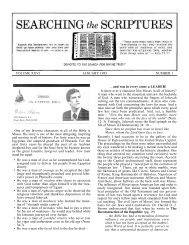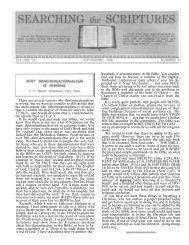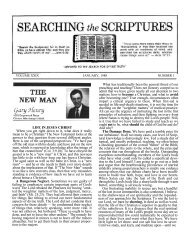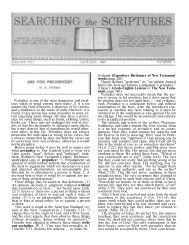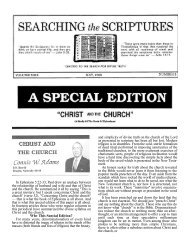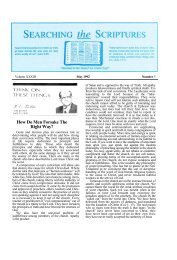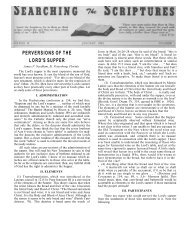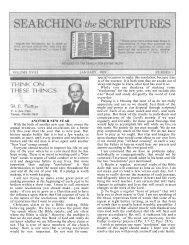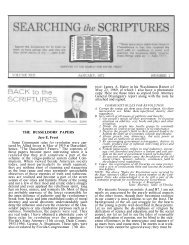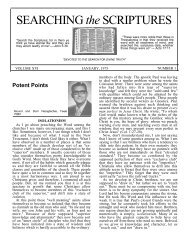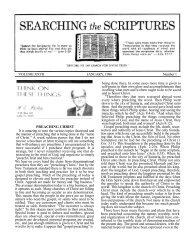Volume 21 – 1980 (PDF) - Searching The Scriptures
Volume 21 – 1980 (PDF) - Searching The Scriptures
Volume 21 – 1980 (PDF) - Searching The Scriptures
You also want an ePaper? Increase the reach of your titles
YUMPU automatically turns print PDFs into web optimized ePapers that Google loves.
Page 10<br />
"new heaven and earth" (Rev. <strong>21</strong>:1) is the old heaven<br />
and earth made over—renovated and purified. Neither<br />
Matt. 5:5 nor related passages teach it. <strong>The</strong> expression<br />
"inherit the earth" in the original text is variously<br />
translated "inherit the land." Its origin involves God's<br />
promise to Abraham (Gen. 12:7). Until Canaan was<br />
conquered by Israel the Jews anticipated the time when<br />
they would "inherit the land." Afterward, the<br />
expression came to be used proverbially with reference to<br />
blessings anticipated at the hand of God (Cf. Psm.<br />
37:3,9,11, 22, 29, 34). Isaiah said, "Thy people also<br />
shall be all righteous: they shall inherit the land for<br />
ever, the branch of my planting, the work of my hands,<br />
that I may be glorified" (Isa. 60:<strong>21</strong>). This verse is part<br />
of the Messianic prophecy which our Lord read and<br />
applied to Himself (Isa. 61:1-3; Lk. 4:16-<strong>21</strong>). <strong>The</strong>refore,<br />
"inherit the land" here refers to the spiritual blessings<br />
received through Christ, the great deliverer. All spiritual<br />
blessings are in Him (Eph. 1:3). According to Isaiah the<br />
objective was "that I may be glorified." Paul says that<br />
this is done in the church (Eph. 3:<strong>21</strong>). Since Jesus was<br />
discussing kingdom principles in the Sermon On <strong>The</strong><br />
Mount, it should not be thought strange that he should<br />
use this proverbial expression to show that "meekness"<br />
is a condition to the spiritual blessings in the kingdom.<br />
<strong>The</strong> expression "coming down from God out of<br />
heaven" (Rev. <strong>21</strong>:2) symbolizes ownership or origin of<br />
the "holy city, new Jerusalem" (the people of God). If<br />
such were seen coming up out of hell or up out of the<br />
sea or up out of the earth (Rev. 13:1,11), it would have<br />
symbolized a different origin. John saw holy people who<br />
truly were of God—the glorious church, "without spot,<br />
wrinkle, or blemish" (Eph. 5:27), "as a bride adorned<br />
for her husband." He then describes the bliss of this<br />
"new heaven and new earth"—the reward of the<br />
righteous, the eternal abode of the saints.<br />
<strong>The</strong> <strong>Scriptures</strong> do not teach anything that would<br />
justify modern day concepts of "<strong>The</strong> New Planet,<br />
Earth," or a Utopian "World Of Tomorrow."<br />
Such is truly an important question especially in the<br />
wake of many modern campaigns, schemes, and<br />
denominational devices that have begun their advance<br />
into the Lord's church. As the cry goes forth as to the<br />
needs of the "modern" church, the answers echoed in<br />
return all too often reflect the attitude of many who see<br />
the church in nothing more than a physical role.<br />
"Fellowship halls," "youth programs," "puppet<br />
ministries," "bus ministries," and all forms of church<br />
supported recreation are among the answers received to<br />
our question. However, is this what the church needs<br />
now? Is this what marks the characteristics of a<br />
"strong" church? Many in the pulpit as well as in the<br />
pew answer emphatically, "NO!" by showing that the<br />
kingdom of God is not eating and drinking (physical),<br />
but righteousness, peace, and joy in the Holy Spirit<br />
(spiritual— Rom. 14:17). And yet, how many of us turn<br />
right around and think that if the church just had a<br />
large meeting house, large attendance, and large<br />
contribution that such would fulfill the needs of the<br />
church and automatically make it strong?<br />
Inconsistent? Indeed it is!<br />
Notice if you will that it is to this problem that Paul<br />
addresses himself in 1 Cor. 1-4. <strong>The</strong> situation here was<br />
one that found the Corinthian brethren viewing the<br />
church from a carnal, fleshly, and human viewpoint and<br />
not from the spiritual standpoint of God (3:1-4). And<br />
the message of these first four chapters to us is that to<br />
be spiritual and understand spiritual things and gain<br />
spiritual values, then we MUST QUIT THINKING<br />
CARNALLY ABOUT THE LORD'S WORK! In view of<br />
this, Dear Reader, let me suggest to you that the<br />
church just needs now what it has always needed.<br />
Gospel Preaching<br />
Whatever happened to soul inspiring sermons on<br />
Repentance, Baptism, Faith, Discipleship, the Church,<br />
Worldliness, the Life, Death and Resurrection of Jesus<br />
etc. . . that used to ring boldly from the pulpits across<br />
the land? Whatever became of the preacher who could<br />
hold his audience spellbound because of his acute<br />
knowledge of the Word of God and yet at the same time<br />
not lose the simplicity of the message so that even the<br />
smallest school child could understand? Whatever<br />
happened to the preacher who would feed his audience<br />
spiritual food based on book, chapter, and verse rather<br />
that a constant diet of commentaries and writings of<br />
men? Now this is not to say that there are no inspiring<br />
sermons being preached today, or that there are no<br />
preachers who can hold an audience, nor is my purpose<br />
to condemn any who might quote a particular scholar to<br />
offer clarity on a specific point or word (I often do).<br />
BUT THE FACT REMAINS THAT AT THE



